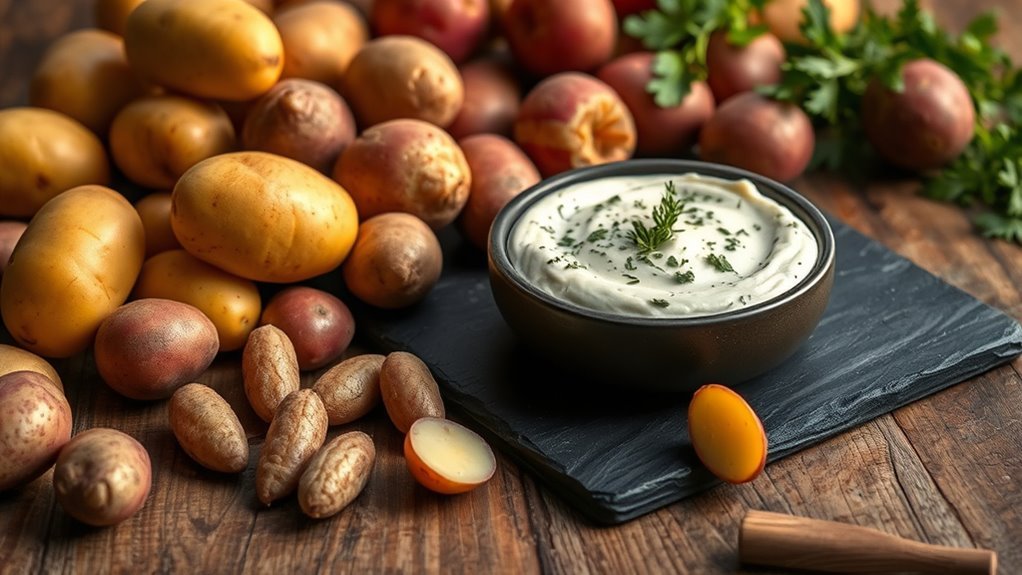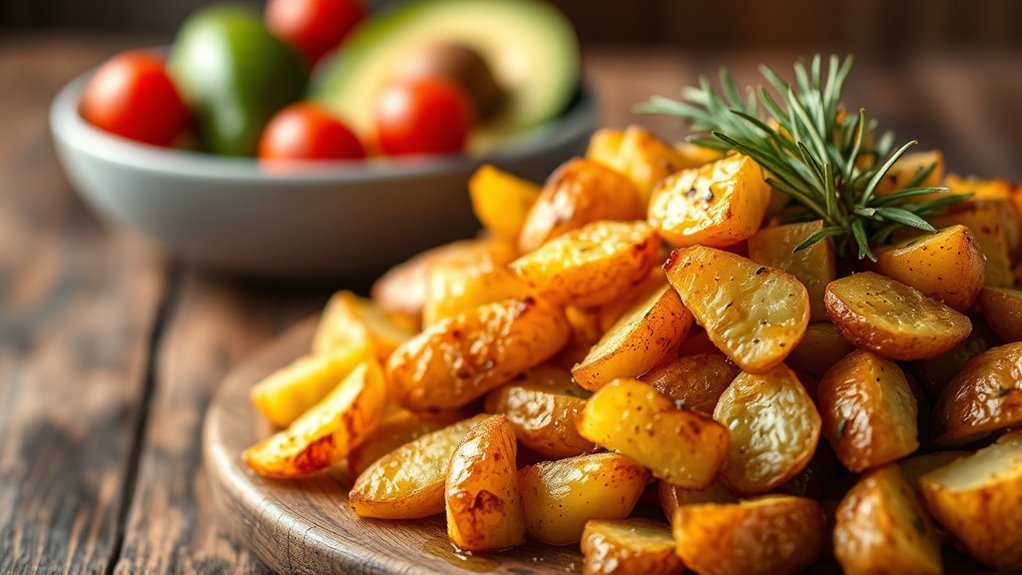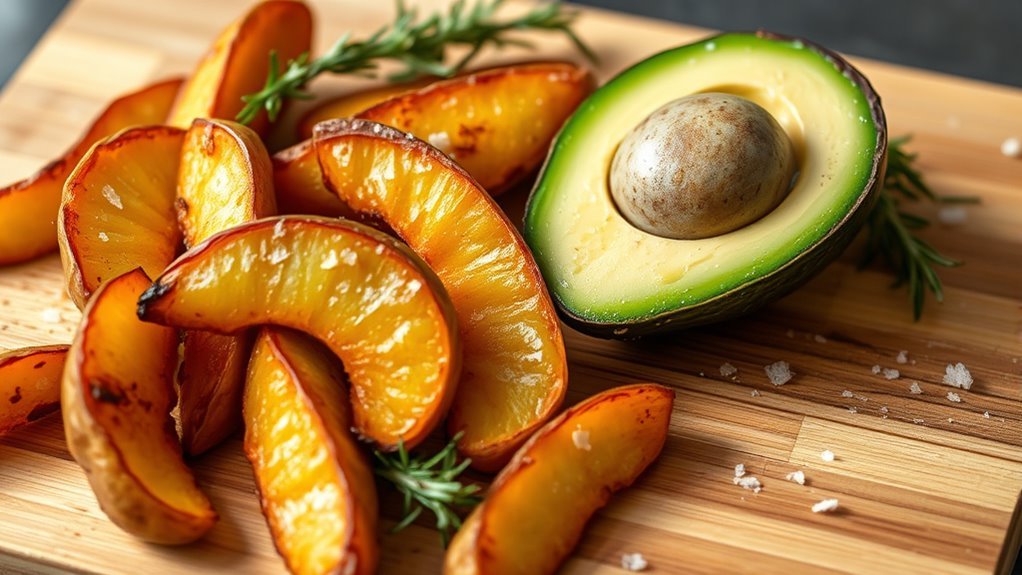Potatoes aren’t considered keto-friendly due to their high carbohydrate content, which can hinder ketosis. A medium potato contains around 30-37 grams of carbs, far exceeding the daily limit of 20-50 grams for maintaining ketosis. Their high glycemic index can also cause rapid insulin spikes, affecting energy levels. While moderation is possible for active individuals, exploring lower-carb alternatives like cauliflower or zucchini can help you stay on track with your keto goals. There’s more to uncover about potatoes and your dietary options.
Understanding the Ketogenic Diet

When you plunge into the ketogenic diet, it’s essential to understand its core principles. At its heart, the ketogenic diet emphasizes a drastic reduction in carbohydrates while increasing healthy fats. This shift encourages your body to enter a state of ketosis, where it burns fat for energy instead of carbs. The low carb benefits are significant; many people experience weight loss, increased energy, and improved mental clarity. Embracing ketogenic principles means focusing on whole foods like meats, nuts, and low-carb vegetables, while avoiding sugary snacks and grains. This structured approach to eating may initially feel restrictive, but it offers a path to freedom from cravings and energy crashes, allowing you to reclaim control over your nutrition and overall health.
Nutritional Profile of Potatoes

Potatoes are often considered a staple food due to their rich nutritional profile. With numerous potato varieties available, each offers unique benefits. For instance, red and purple potatoes are known for their high levels of antioxidants, while sweet potatoes provide a wealth of vitamins like A and C. Regarding nutrient density, potatoes are packed with essential nutrients, including potassium, fiber, and B vitamins. This makes them a valuable addition to a balanced diet. Remember, the way you prepare potatoes can impact their nutritional value, so consider healthier cooking methods. Ultimately, understanding the nutritional profile of potatoes can empower you to make informed choices when it comes to your meals and overall health.
Carbohydrate Content and Ketosis

While many people enjoy potatoes for their taste and versatility, their high carbohydrate content can be a concern for those following a ketogenic diet. A medium potato can contain around 30 grams of carbs, which could easily exceed your daily limit for carbohydrate intake. If you’re aiming for ketosis, carbohydrate moderation is key. Staying under 20-50 grams of carbs per day helps maintain ketosis, allowing your body to burn fat for fuel instead of glucose. Consequently, incorporating potatoes into your diet might disrupt your progress, making it challenging to achieve ketosis maintenance. If you’re craving something starchy, consider alternatives like cauliflower or zucchini that offer lower carbohydrate counts while still delivering satisfying textures.
Impact of Potatoes on Blood Sugar Levels
When considering how potatoes affect your blood sugar levels, it’s essential to understand their glycemic index (GI). Foods with a high GI can cause rapid spikes in insulin, which may be a concern for those managing their blood sugar. Factors like preparation method and portion size also play a critical role in how your body responds to these starchy vegetables.
Glycemic Index Explained
Understanding the glycemic index (GI) is essential for managing blood sugar levels, especially for those following a ketogenic diet. The GI measures how quickly foods raise your blood sugar, providing insight into their glycemic response. Potatoes typically have a high GI, which means they can spike blood sugar levels more than many other foods. Here are some key points to reflect on:
- High GI foods can lead to rapid blood sugar spikes.
- Low GI foods promote stable energy levels.
- Pairing potatoes with proteins or fats can lower their GI impact.
- Cooking methods can affect a potato’s GI.
- Individual responses to carbs may vary.
Insulin Response Factors
The glycemic index provides a foundational understanding of how foods like potatoes can affect blood sugar levels, but it’s important to contemplate how insulin response plays a role in this equation. When you consume potatoes, your body releases insulin to manage the resulting blood sugar spikes. Insulin sensitivity, or how effectively your body responds to insulin, can greatly influence this process. If you’re maintaining hormonal balance, your body should manage these spikes more efficiently, potentially minimizing negative impacts. However, frequent high-carb meals can lead to insulin resistance, complicating blood sugar regulation. As a result, if you’re considering potatoes in your diet, keep in mind your overall insulin sensitivity and how it may affect your experience with blood sugar levels.
Types of Potatoes and Their Carbohydrate Variations
When considering potatoes on a keto diet, it’s essential to understand the differences between starchy and non-starchy varieties. Each type has its own nutritional breakdown, affecting carbohydrate content and overall impact on ketosis. By examining these variations, you can make informed choices that align with your dietary goals.
Starchy vs. Non-Starchy
While many people enjoy potatoes as a staple food, it’s essential to recognize that not all potatoes are created equal, especially when considering their carbohydrate content. Potatoes fall into two main vegetable classifications: starchy and non-starchy. Starchy vegetables, like potatoes, pack a higher carbohydrate punch compared to their non-starchy counterparts. Here’s a quick breakdown of the differences:
- Starchy Potatoes (e.g., russets, Yukon golds)
- Non-Starchy Vegetables (e.g., cauliflower, zucchini)
- Carbohydrate Sources (varies considerably)
- Nutritional Impact (affects blood sugar levels)
- Dietary Choices (keto-friendly options matter)
Understanding these distinctions will help you make informed choices about which carbohydrates to include in your diet. Always consider your personal health goals when selecting vegetable sources.
Nutritional Breakdown Comparison
Understanding the nutritional differences between various types of potatoes can greatly impact your dietary choices, especially on a keto diet. Different potato varieties like Russet, red, and sweet potatoes vary considerably in carbohydrate content. For instance, a medium Russet potato contains around 37 grams of carbs, while a small red potato has about 15 grams. Sweet potatoes, while often considered healthier due to their vitamins, still pack around 27 grams of carbs per medium-sized serving. While these potatoes offer health benefits, including vitamins and fiber, their higher carb counts can be challenging for those aiming for ketosis. By knowing these variations, you can make informed choices that align with your dietary goals without feeling restricted.
Impact on Ketosis Levels
Although potatoes are a staple in many diets, their high carbohydrate content can significantly affect your ketosis levels if you’re following a keto lifestyle. When considering potato consumption, it’s crucial to understand their ketosis impact. Different types of potatoes vary notably in carbs:
- Russet Potatoes: High in carbs, typically around 37 grams per medium potato.
- Sweet Potatoes: Also high, with about 26 grams per medium potato.
- Red Potatoes: Contain around 30 grams each.
- New Potatoes: Similar to red, with about 27 grams of carbs.
- Cauliflower (as a substitute): Only around 5 grams of carbs per cup.
If you’re aiming to maintain ketosis, it’s wise to limit or avoid these starchy options and explore low-carb alternatives.
Alternatives to Potatoes on a Keto Diet
If you’re following a keto diet, you might be wondering what to replace potatoes with, as they are typically high in carbohydrates. Fortunately, there are plenty of delicious alternatives. Cauliflower rice is a fantastic substitute that can mimic the texture of traditional rice. Zucchini noodles, or “zoodles,” can serve as a low-carb pasta alternative. If you crave fries, try turnip fries or eggplant chips for a crunchy snack. Radish mash can provide a creamy side dish, while spaghetti squash is perfect for your pasta cravings. Butternut squash and parsnip puree are great for a sweeter touch. Finally, for a hearty meal, consider mushroom risotto or celery root for a satisfying base. Enjoy experimenting!
Incorporating Potatoes in Moderation
While traditional potatoes are often seen as a no-go on a keto diet due to their high carb content, incorporating them in moderation can be possible for some people, especially those who are more active. Finding the right keto balance is key. Here are some tips for potato moderation:
- Opt for smaller portions to control carb intake.
- Choose nutrient-dense varieties like sweet potatoes or red potatoes.
- Pair potatoes with healthy fats, like olive oil, to balance the meal.
- Monitor your overall carb intake throughout the day.
- Stay active to help manage blood sugar levels.
Final Thoughts on Potatoes and Keto
As you navigate the complexities of the keto diet, it’s essential to recognize that potatoes can still play a role for some individuals, especially when consumed thoughtfully. While traditional potato varieties like russets and red potatoes are high in carbs, opting for smaller portions or selecting lower-carb options, such as cauliflower or sweet potatoes, can provide keto flexibility. You don’t have to completely eliminate potatoes from your meals; instead, consider balancing their intake with your overall carb counts. By doing so, you can enjoy the taste and texture of potatoes while still adhering to your dietary goals. Ultimately, it’s about finding what works best for you and your body, allowing you the freedom to enjoy diverse foods within your keto lifestyle.
Frequently Asked Questions about Potatoes and Keto Diet
1. Are potatoes keto-friendly?
Potatoes are generally not considered keto-friendly due to their high carbohydrate content. A medium-sized potato can contain about 30 grams of carbs, which can quickly exceed the daily carb limit for those following a ketogenic diet, typically set at around 20-50 grams of carbs per day. However, the overall context of your diet and the specific type of potato may influence their suitability for your individual keto plan.
2. What are the carb counts of different types of potatoes?
Different types of potatoes have varying carbohydrate counts. For example, a medium russet potato has about 37 grams of carbs, while a medium red potato contains approximately 28 grams. Sweet potatoes are similarly high in carbs, averaging around 26 grams for a medium-sized one. If you’re following a keto diet, you may want to consider lower-carb alternatives such as cauliflower or zucchini instead.
3. Can I include small amounts of potatoes in a keto diet?
While traditional keto diets limit carbohydrate intake, some individuals may choose to include small portions of potatoes occasionally. If you do, it’s essential to monitor how these fit into your daily carb allowance. Opting for smaller servings and balancing your meals with higher-fat and lower-carb foods can help you stay within your limits while still enjoying potatoes in moderation.
4. What are some keto-friendly alternatives to potatoes?
For those following a ketogenic diet, there are several low-carb alternatives to potatoes. Cauliflower is one of the most popular substitutes, often used to make cauliflower mash or rice. Other options include turnips, rutabagas, and zucchini, which can be prepared in various ways to mimic potato dishes while keeping carb counts low.
5. How do potatoes affect ketosis?
Including potatoes in your diet can disrupt ketosis due to their high carbohydrate content. When you consume too many carbs, your body may switch from burning fat for fuel to burning glucose, effectively halting ketosis. If your goal is to maintain a state of ketosis, it is advisable to limit or avoid potatoes and focus on low-carb vegetables instead.
References
- https://www.healthline.com/nutrition/are-potatoes-keto-friendly
- https://www.ncbi.nlm.nih.gov/pmc/articles/PMC6469923/
- https://www.washingtonpost.com/food/2021/01/27/are-potatoes-keto-friendly/
- https://www.mayoclinic.org/healthy-lifestyle/nutrition-and-healthy-eating/expert-answers/keto-diet/faq-20484918
- https://www.verywellfit.com/are-potatoes-keto-friendly-5190151
- https://www.cdc.gov/nutrition/data-statistics/know-your-limit/vegetables.html


